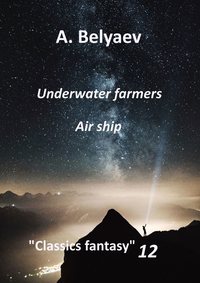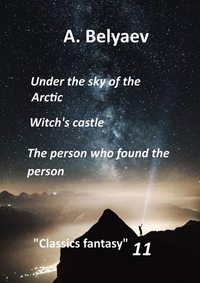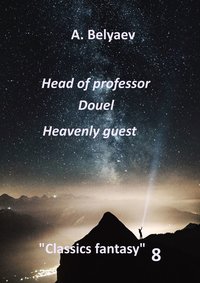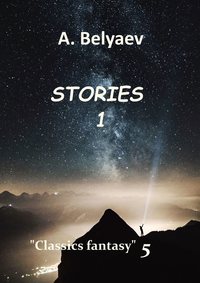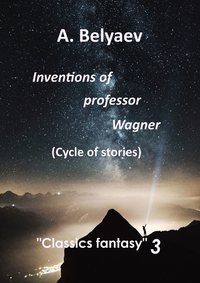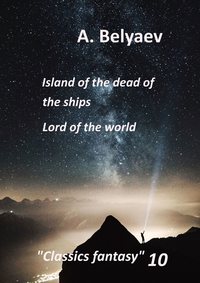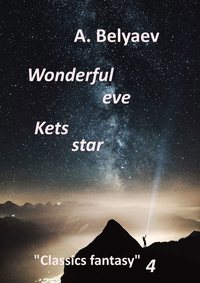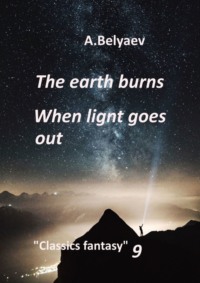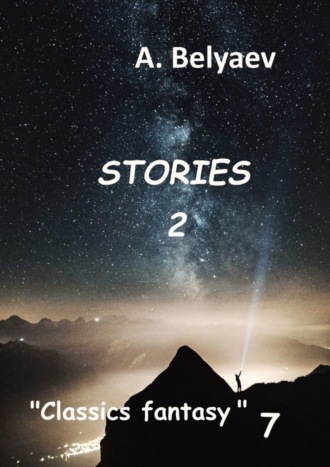
Полная версия
Classics fantasy – 7. Stories-2
I got acquainted with all this, having lived in hotel about a week.
The nickname calmed me: he already reported about my arrival, and no other registrations are required. “As for servants, they do not need to be an eyesore to you at all. If to you that – — is necessary, you can cause them, and they watch purity when you are not in number: will tidy up, will sweep out, will clean”.
There were we hotel not towards the railway tunnel cutting all building through any more, and on other side. Directly before us the wide platform surrounded with the park opened. In the middle, on graceful concrete columns, the canopy under which cars settled down rose. Near the parking of cars was big, in two square meters, the city map drawn on opaque glass. All streets and public buildings were renamed in the special list, and against each name the button was seen. If I needed to go, for example, to “Revolution Square”, then I pressed the button against this name, and on the plan from the station where I am, stretched the shining arrow, clearly specifying in what direction I had to go or go.
– If you want, it is possible to take the bicycle – Nick told me – and to reach to the center. However, it is not so far. It is possible to employ a taxi or to get on a bus. You look, on the plan number of the bus is specified.
– I thank you, morning fine, and I prefer to walk on foot – I answered. Nick willingly volunteered to accompany me.
We passed by the taxi stand and went deep into the park.
I would like to give you my first impression of the city perhaps more stoutly. In it there was some originality which at once I could not understand. It is remembered, similar I tested something when I with a working excursion arrived to Venice. Venice – the special city.
The train with a usual roar and noise is rolled in the covered station. You leave directly to the channel – and you are covered by silence, extraordinary for the city. In all Venice there is no car and any horse, except for those that stand on St. Mark’s Basilica, but they are bronze! And when you go on narrow Venetian ulichka and on Mark Square, you are pursued by strange feeling – as if it is not the city, and… the house without roof. Similar I tested something when I left hotel and went to wander about the city of Yuzhkhim. Here everything was differently, not as in our noisy, confused, mad cities of the West and America. Others were also people here. Neither slackness, nor sluggishness! All whom I met were vigorous, cheerful and mobile, but without the excess fussiness and nervousness characterizing the residents of the big capitalist city who are eternally hurrying, worrying, stepping each other on legs.
Parks and Yuzhkhima Street seemed to me, perhaps, even too poorly populated for the city accomodating sixty thousand people. “Why it?” – I thought and immediately answered myself: “It is the city of workers, and workers are at work now”. This explanation was correct, but not absolutely exact as subsequently I was convinced. Besides that the fifth part of all workers were “days off”, workers worked in three changes, and actually, so at the plant there was no more than a third. The relative malolyudstvo was explained by many reasons. In Yuzhkhim there was no division of the city into the boring uncomfortable suburbs and the elegant center which is pulling together almost all population to the show-windows and fires of cinema. By Dezurbanization it was shown not only that people refused construction of the unhealthy huge cities octopuses with the multimillion population here, but also that within the city all public places are decentralized, except, of course, city Soviet institutions of city value (the City Council with all its departments is located on Revolution Square). Theaters, cinema, the museums, clubs, libraries and other cultural institutions evenly of a raskinuta on all city, and cinema of the suburb differs in nothing from cinema in the downtown.
Walking are also scattered on all city evenly, all city – the continuous park; a part of the population was chosen to the country by boats, on foot and in cars. Besides, in Yuzhkhim there is no most mobile and fussy street passerby – the buyer and in particular customers. I will not tell that they are absent at all. But dump from the account only the housewives and women of fashion who are absent here and flooding our shops, and you will see as far as will become silence! I Feel that you represent a little what I write about. New words or long descriptions are necessary. Here, for example, I told “traffic”, you, of course, represent sidewalks, quite narrow, near gray bulks of buildings. And on these sidewalks the continuous moving mass of people, dense, as a school of the going herring. And in the middle of the street “ice drift” of cars. But it is far from what I see. There is no “street” in sense of this word usual, habitual to us even. There is no solid wall of the houses pressed to each other closely. You even not always see houses. You go on the beautiful park. Trains of the suspended railroad almost silently blow over tops of trees in hours of the beginning and completion of works at the plants. You go on a beautiful twisting path to shadows of chestnuts, lindens, elms, oaks, hornbeams, maples. Continually – benches with convenient backs, beds of flowers.
Flowers, flowers! Your Marta has to forgive for these flowers a lot of things that would not be pleasant to her in this original city. But I am sure that if Marta lived though month here, she would not want to return to the pathetic flowerpots on a balcony. It seems, so do not love flowers anywhere as here. And the chief flower growers-gardeners are children. They go from a bed to a bed and bring order. But strange thing: the walking children in parks are not enough, and there are no nurses with babies on hands at all. Only adults wander about parks and the flock of children only occasionally will flutter out and will disappear or there will pass mother with children.
At my first acquaintance with the socialist city this absence of children I charged to shortcomings. It is bad when children rustle, disturb and bother seniors, but it is boring also without children… Subsequently I was convinced that children take the much bigger place in city life, than I assumed and that they take in city life the most live part almost in all areas of life and especially in improvement maintenance. Obviously, just there was such hour when children were at school or in the country.
Near a path for pedestrians the bicycle path stood at attention. Easy hissing of tires is continuously heard – it athletes and sportswomen rush, having cheerfully something in common. Behind a bicycle path – again the site of the park, and further – the bus, well asphalted road. There are no trams here, they are replaced with buses long ago. Behind the road one more park layer, behind it a house wall, but you can not see it as houses are scattered at considerable distance from each other here. They stand as the locks surrounded with parks.
In parks beautiful booths – book, snack, confectionery, with mineral waters, fruit are seen here and there. But, Fritz, take heart, my friend, I will strike you the most terrible news: not only in the city, but also in all city there is no tobacco booth, any tobacco shop, any cigar, a cigarette, a tube! Isn’t that so, “it is awful”? !
– Would you like to pass here here, to the right – Nick offered.
We turned to the shady chestnut avenue. It brought us to quite wide round platform with the fountain in the middle. The platform was surrounded by skillfully made statues of leaders of the world proletariat and several groups. In realistic and at the same time simple and clear symbols they represented the main stages of fight of the proletariat and creation of socialism. About this platform of a sculpture it would be possible to write the whole book… yes it, apparently, and it is written. I was surprised and delighted.
– Who creator of these magnificent statues? – I asked the conductor.
– Workers of our plants – he answered simply – among them is many excellent musicians, sculptors, painters, poets.
– But the school is necessary here, and the school demands time, persistent work for overcoming the equipment.
– Well, and that? – Nick asked. And he explained that all this result of reasonable use of leisure of which the socialist worker has more, than at the worker of the bourgeois countries.
– We work only several hours, and we assume to work even less. At the correct organization of work, production and distribution what exist at us it is quite enough to provide us to all necessary, but do not think that we use the leisure only for an entertainment and rest. If it was so, we would go not forward, and back and socialism would create only stagnation of stupid content. No, our leisure is filled with very “energetic” contents. As the old zealous owner owner did not cease to care for the plot of land, for the small economy, and we, without reckoning with time, we care for our socialist economy. We do not cease to care also for those which still groan under a capital yoke. On all this a lot of time, perhaps, not less than two thirds of free time leaves. Then physical culture, then occupations favourite arts and, at last, entertainments.
By the way, whether you know that we already created a new narcomat – culture and life which deals with issues of the most reasonable use of working leisure and the organization of new life? Thanks to reasonable use of leisure at us almost each worker has several specialties. One went to science, others – to art. We have firemen-chemists and plumbers-journalists, the turner-astronomers, milling-machine operators-sculptors. Does not disturb one another at all. Exclusive talents – musicians, poets, writers – were granted the right to be engaged only in art. But even the most gifted of them periodically come back to factory: work change, according to them, not only does not affect adversely creativity, but even stimulates it.
Here I dropped a hint of doubt:
– I can understand that, say, the coppersmith can be an astronomer, even the painter. But whether the fireman can vykholit the gentle flexible fingers necessary for the violin virtuoso? Whether the coalminer-miner can be a pianist?
– Well, so they will be not musical virtuosos, but astronomers – smiling, Nick answered. – However every year the car more and more facilitates heavy physical work and thus protects a human body from an excessive posterization. I do not say any more that a number of productions demands thin, sensitive as from the pianist of fingers – for example, production of exact tools, pocket watch, tungsten threads for electric bulbs. Of course, there are difficulties which we cannot overcome still. You see before yourself not notorious “paradise on the earth” but only the improved human society. The facts, however, it is available: simple workers created these statues, workers play in our theaters, sing in the opera, paint pictures, produce in the manual way graceful bagatelles for decoration of our dwellings and public buildings in free time. From an accordion, from “bayan” the worker rose to a difficult electric symphonic grand piano with three keyboards, pedals and mass of registers, and he owns this tool not worse, than the machine… Well, and now I will show you the center of our city.
– Everything you have a center?
– Yes, but it has absolutely other value, than in the old cities. There lived aristocrats, here at us are located… However, you will see now!
But before we reached Revolution Square, I had to stop once again. We approached a wall of the turning green bushes which were cut through by the narrow asphalted path. Having taken several steps, I screamed from delight: before us there was the real dwarfish Japanese garden. As a matter of fact, it was the ravine, but that was made by culture with this ravine! On its slopes streamed and cheerfully small falls jumped, on a bottom the pure stream proceeded, falling into a reservoir with the fountain in the middle and red small fishes in water: through a stream easy graceful bridges were thrown here and there. The arbors twisted with an ivy attracted in a dense shadow, among greens and flowers small statues of children, swans, animals were seen. The second reservoir, in the corner, had a great sculptural group – the small child, chubby as cupid, gave on a watering place couple of young lions who bent on a watering place as the drinking cats. And flowers, flowers! Cascades of flowers!.
– I remember still that time – Nick told – when on this place there was a thrown wild ravine where the nettle yes a burdock grew. And here what we made. It was the invention of children.
We slowly passed “ravine”, rose by other party and at once got on the wide platforms which are filled in with the sun. There was a tennis, soccer, пушбол, the basketball, volleyball and is a lot more others, unknown to me, sports. All platforms were full players – women, men, young and old.
– Here it is never empty – Nick told me.
I could not but stop. Sports were very curious here. According to Nick, some of them were borrowed from the small nationalities inhabiting the USSR. Here, for example, a construction which I would compare to a huge drum in three meters in the diameter and meter height. On this reel there is a young girl in a sports suit and jumps up. The drum springs probably on it thick rubber is tense, and the girl flies up above and above. People around encourage it with approval exclamations. A game consists in that, having jumped up to fall by legs and not to fall, again to jump up and again to fall. Amazingly! This girl seems weightless. It jumps up above and above – on meter, two, three, four, five, six! – and dexterously becomes independent for a new jump. But here jumps become lower and lower, and the girl descends from a drum to the applause. After it does not care the man of average years gets and under approving and derisive exclamations begins to jump up. The second jump, the third jump – and it flies head over heels, falls on a back and begins to fly up up, sideways, the head in the most helpless situation. Laughter and shouts, the loser slips from a drum, having hopelessly waved a hand.
And further fly – more true, jump – through the area people with the attached small balloons which counterbalance the weight of their body. The person “weighs nothing” and at the slightest jump separates from the earth. It is remembered, such sport was invented in America. But what dexterity and accuracy at these flying people! And here something absolutely unprecedented. At athletes on soles springs because these athletes jump as just right to jump only to a flea are attached probably. This sport demands big dexterity and threatens with big risk, than jumps on a drum. But jumpers, obviously, are well trained and dexterously jump through booths and even through small trees.
But, alas, I should constrain myself again, otherwise I will never end the external description of the city. It was necessary to come off an interesting show and to follow further. Again the shady avenue, and here we by two white buildings come to the big square.
What to tell you about it? Whether to compare it to a huge crater of a volcano or to the Roman amphitheater? Looking at this square, I was once again convinced what huge advantage is in building the city not in tens and in hundreds of years, and to build at once, according to a certain plan. Only under such condition it was possible to make this the area, most original in the world, at once. It has absolutely round form. From all directions it is surrounded by buildings which are built so that ledges go down to the area the floor behind the floor. On each ledge there are ranks of benches towering one above another. On the square, running up up to the height of the first floor, the real amphitheater making a whole with the amphitheater which settled down on ledges floors of surrounding houses is located. Thanks to such device one grandiose amphitheater which can contain almost all population of the city turns out. It is real Greek “agora” (area) on which there were meetings. It is curious to note that, despite the huge size of the area, it can become covered by special awnings during a rain or strong heat.
In the middle of the area there is a high tribune supplied with megaphones which do possible to hear the speech of the speaker equally distinctly in all corners of a grandiose amphitheater. In houses which are located around the area government agencies are located. It is, so to speak, the municipal center. In a northern corner of the square the grandiose figure of Lenin with the raised hand towers. I represent what majestic show is made by this area when it is full of the people, and in particular in the evening when from edge to edge it is penetrated by fires of searchlights! Nick says that on holidays it is illuminated and then even more beautiful and solemn show turns out. Here citizens the most solemn and important minutes of public life gather.
While I visited the square, it was almost deserted, except for several young glider pilots who excitedly started models of gliders from numerous top platforms.
– Air sport – Nick told – has absolutely exclusive success in us. Try to go beyond the city and to look what there becomes. Our glider pilots reached in this sport of big perfection, they keep on motorless devices the whole day. Besides, very curious motorless air yachts, air sailing vessels which by means of the planes and wings make are designed, using only a wind force, quite considerable travel. However, it was given not at once. Several our air athletes on such air yachts, without having taken care to gain sufficient height, on favor of the wind which ceased to blow mudflows among fields, having decently crumpled wheat, and we had about it even “diplomatic complications” to the neighboring agricultural city. It was necessary to reward them for losses, and to transfer skilled flights to strictly certain places.
– Well, now where you will lead me? – I asked, having admired Revolution Square.
– Nearby from there is a museum of manual skills. You want, we will examine it – Nick offered.
Museum of manual skills! What could it be? Possibly, something historical. To admit, I not really love such museums. But here, in this city, everything was special and therefore I did not protest. Probably, and in the field of studying of history there will be something original.
We went to the museum of manual skills.
Guess where I got? On an exhibition of the most wonderful, most beautiful works of art! However, not only arts. Partly it reminds huge department store with a set of offices. Pictures, sculptures, frames, books in amazingly beautiful covers, vases, statues, carved furniture, hats, gloves, footwear, fabrics. Fabrics especially interested me in fine manual manufacture and an art coloring. All this is performing manual skills, actors of the business, “fans”. How many here is a delicate taste how many love patience! Here for what spend the leisure rest here. Almost each communitarian goes in at a leisure for some craft, applied or pure art. For this purpose in the house commune various workshops, laboratories, studios, studio are arranged. It is really free, creative, not forced labor. One does graceful covers, another – a framework, the third or third is engaged in art embroideries or manual weaving, the fourth paints pictures, and besides absolutely not in an amateurish way – is juicy, surely.
Almost all these objects have practical value and at the same time are original works of art. They are done because process of creativity it gives pleasure. They are done as the bird sings the songs. Then their authors give these fine products to relatives, friends or expose in the museum of manual skills. Everyone can get to himself several such things. The commune strictly watches that living rooms did not turn into a warehouse of furniture and did not remind the antiquary’s bench. Anything superfluous, anything unnecessary! But the commune does not prohibit to have at itself in the room several good things which would decorate the room: several pictures on a wall, a figurine on a desk, a flower vase. Communitarians quite often change these works of art, and very pleasant – transport with themselves, changing the room or the city.
In the museum of manual skills there were very many visitors. Women reached more for fabrics, hats, suits – a remnant of old psychology! However, has to counterbalance this impression with the instruction on the fact that the considerable number of women crowded also near such departments as binding, frame and even optical and physical devices. Be not surprised: there are excellent shlifovalshchik of lenses photographic, astronomical and microscopic. Grinding – not so much the equipment, how many art.
We stayed in the museum of manual skills long enough, and I wanted to have breakfast. There is nothing more simply: the buffet was right there, at your service. You can choose any food, not only cold appetizer, but also the roast hissing on the electric stove.
– Nevertheless you can be tired. Whether not to take us the bicycle?
– Yes, perhaps, it not superfluous! – The nickname went to depot of hire and received couple of bicycles from there.
– Let’s make the general review of the city – he offered. – By bicycle it will take away a little time.
I agreed, and, having saddled our steel horses, we started at way. On the way I paid attention that houses in the majority are built as “block”. The main big house is connected by a warm corridor to the house less, and the one-storey house with a set of glass verandahs stands apart – Nick explained to me that the main house commune is connected by a corridor to a day nursery where there are children. Through a corridor parents can go out on dates to children… I feel that I approach questions which will cause a hot objection of your Marta, but we still will talk about it! Now I write only about the first impressions. So, in one house there live adults, in another a day nursery, and in the third, standing independently is located, there is a kindergarten. Children! So much attention how many it is not given anywhere and never is paid to them here. Day nursery and kindergarten do not limit child care facilities. We passed by the real children’s town. I only for a moment could look at it. I saw the big two-storeyed building with huge windows painted in the gentle cream color which was well shading surrounding greens. I saw the cheerful kids filling with the voices flower beds, kitchen gardens, gardens, platforms for games. I saw outdoor constructions which purpose was explained to me by Nick.
– This big building – school. School students here not only study, but also live in this building. And outdoor constructions are skilled hleva, pigsties, rooms for rabbits, for poultry. Our school students first of all practicians!
I decided to visit by all means school – this factory at which develop new socialist people. But having decided to sight-see at first the city “in general”, I was forced to go further.
– At us it is several such schools. They are evenly scattered across all territory of the city. There, you see two white stocky buildings in a garden? It is the insulator for children, suspicious on a disease. Nearby – hospital.
Having passed the dense park with two big ponds, we came out to the river bank. The sunlight after a penumbra of the park blinded me and when I opened eyes, saw the wide river dazzling with boats of all sizes and types. Here were also long narrow – on ten oarsmen, and small – on one person, with a cross over two-bladed oar, both motor, and sailing, and double pies, and water skis, and water bicycles, balsas, floating spheres, the spinning circles… All this moved, had cheerfully something in common, splashed water… There was an abundance of air, the sun and water. Here it was cheerful and noisy. Half-naked people rowed competing in speed, jumped out of boats water, dived, drove a big rubber sphere on water, competed in speed of swimming. And below – on the sandy beach sunbathed in the sun… From this city it is not necessary to come out to the dacha: it is the real “country city”, the resort town! There is no more separation of the city dweller by nature, from the sun, from fresh air. Having become the owner of life, the worker of the USSR first of all took care of destroying the capitalist cities – these nests of diseases and an infection, exhaustion and degeneration.


